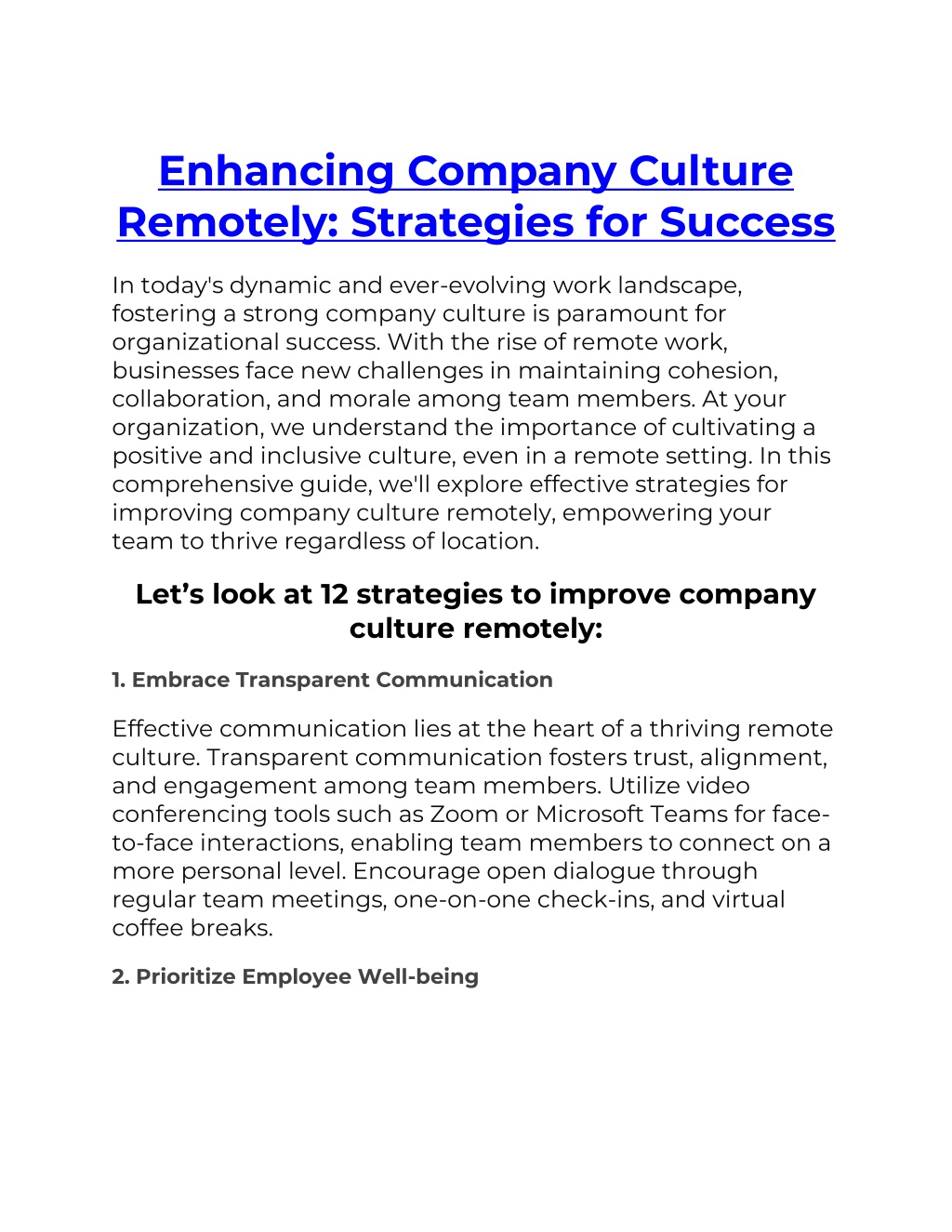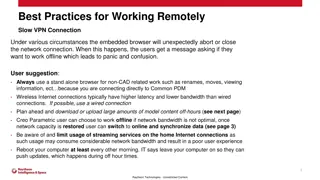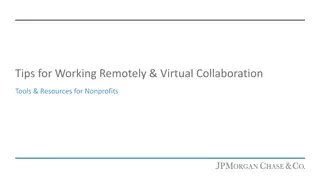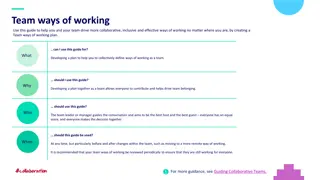
Enhancing Company Culture Remotely- Strategies for Success
In today's dynamic and ever-evolving work landscape, fostering a strong company culture is paramount for organizational success. With the rise of remote work, businesses face new challenges in maintaining cohesion, collaboration, and morale among tea
Download Presentation

Please find below an Image/Link to download the presentation.
The content on the website is provided AS IS for your information and personal use only. It may not be sold, licensed, or shared on other websites without obtaining consent from the author. Download presentation by click this link. If you encounter any issues during the download, it is possible that the publisher has removed the file from their server.
E N D
Presentation Transcript
Enhancing Company Culture Remotely: Strategies for Success In today's dynamic and ever-evolving work landscape, fostering a strong company culture is paramount for organizational success. With the rise of remote work, businesses face new challenges in maintaining cohesion, collaboration, and morale among team members. At your organization, we understand the importance of cultivating a positive and inclusive culture, even in a remote setting. In this comprehensive guide, we'll explore effective strategies for improving company culture remotely, empowering your team to thrive regardless of location. Let s look at 12 strategies to improve company culture remotely: 1. Embrace Transparent Communication Effective communication lies at the heart of a thriving remote culture. Transparent communication fosters trust, alignment, and engagement among team members. Utilize video conferencing tools such as Zoom or Microsoft Teams for face- to-face interactions, enabling team members to connect on a more personal level. Encourage open dialogue through regular team meetings, one-on-one check-ins, and virtual coffee breaks. 2. Prioritize Employee Well-being
Investing in employee well-being is essential for cultivating a positive company culture remotely. Implement initiatives such as flexible work hours to accommodate diverse schedules and promote work-life balance. Provide resources for mental health support and encourage employees to take regular breaks throughout the day. Organize virtual wellness activities such as yoga sessions, meditation workshops, or team challenges to promote physical and mental wellness. 3. Foster Virtual Collaboration Collaboration is the cornerstone of innovation and productivity. Leverage collaboration tools such as Slack, Trello, or Asana to streamline project management and foster teamwork. Encourage cross-functional collaboration by creating virtual collaboration spaces where team members can share ideas, brainstorm solutions, and collaborate on
projects in real-time. Celebrate achievements and milestones to foster a sense of team camaraderie and recognition. 4. Promote Continuous Learning Empowering employees to grow and develop their skills is essential for long-term success. Offer online training programs and professional development opportunities to support continuous learning and skill enhancement. Encourage employees to pursue certifications relevant to their roles and interests, providing them with the resources and support needed to succeed. Foster a company culture remotely of curiosity and knowledge sharing by organizing virtual lunch and learn sessions, book clubs, or skill-sharing workshops. 5. Cultivate a Sense of Belonging
Remote work can sometimes lead to feelings of isolation and disconnection. It's crucial to cultivate a sense of belonging and inclusivity within your remote team. Implement virtual team-building activities such as virtual happy hours, online games, or virtual team challenges to foster social connections and strengthen relationships. Celebrate cultural diversity and create opportunities for employees to share their backgrounds, traditions, and experiences. 6. Lead by Example Leadership plays a pivotal role in shaping company culture remotely. Lead by example and embody the values and behaviors you wish to instill within your organization. Demonstrate empathy, transparency, and accountability in your interactions with team members. Solicit feedback regularly and actively listen to the concerns and suggestions of your team. Recognize and reward behaviors that align with the company's values, fostering a culture of trust and mutual respect. 7. Encourage Autonomy and Empowerment Granting employees autonomy and empowerment fosters a sense of ownership and accountability, even in a remote setting. Allow team members to set their own goals and prioritize tasks based on their strengths and preferences. Provide opportunities for self-directed projects and innovation challenges, empowering employees to take initiative and contribute to the company's success. Offer support and guidance as needed, but trust your team to make informed decisions and drive results independently. 8. Foster Mentorship and Coaching Mentorship and coaching are invaluable resources for employee growth and development. Establish mentoring
programs where experienced employees can share their knowledge and insights with newer team members. Encourage peer-to-peer mentoring to facilitate knowledge exchange and skill development within the team. Invest in leadership development training for managers to equip them with the skills needed to support and mentor their direct reports effectively. 9. Create Opportunities for Social Connection Building strong social connections is essential for remote teams to thrive. Organize virtual social events such as virtual happy hours, game nights, or themed parties to foster camaraderie and rapport among team members. Implement online networking platforms where employees can connect with colleagues across departments and locations. Encourage informal watercooler chats and virtual coffee breaks to facilitate casual conversations and relationship-building. 10. Promote Diversity, Equity, and Inclusion
Embracing diversity, equity, and inclusion is critical for creating a supportive and inclusive remote culture. Implement anti-bias training to raise awareness of unconscious biases and promote inclusive behaviors within the team. Establish employee resource groups (ERGs) focused on diversity and inclusion initiatives, providing a platform for underrepresented employees to voice their perspectives and advocate for change. Regularly assess policies and practices to ensure they promote equity and fairness for all team members. 11. Encourage Work-Life Integration Striking a balance between work and personal life is essential for employee well-being and productivity. Encourage work- life integration by offering flexible scheduling options that accommodate individual preferences and responsibilities. Implement boundaries and guidelines to improve company
culture remotely and prevent burnout and promote healthy work habits. Encourage employees to disconnect and recharge outside of working hours, emphasizing the importance of self-care and personal time. 12. Leverage Technology for Engagement Technology can be a powerful tool for enhancing remote engagement and collaboration. Explore virtual team-building platforms and gamification tools to make remote interactions more engaging and interactive. Utilize social intranet platforms or virtual bulletin boards to share updates, announcements, and recognition within the team. Leverage collaborative software such as Google Workspace or Microsoft Office 365 to streamline document sharing, co-authoring, and project collaboration. Conclusion In conclusion, nurturing a strong company culture remotely requires intentionality, effort, and commitment from both leaders and employees. By prioritizing transparent communication, employee well-being, virtual collaboration, continuous learning, a sense of belonging, and exemplary leadership, you can create a thriving remote culture where team members feel valued, supported, and empowered to succeed.
















































